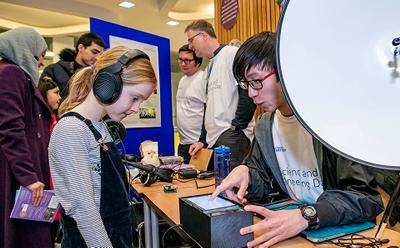Schoolgirl’s imaginative invention for people with hearing impairments inspires ‘Super Hearing Dish’

A primary school girl’s innovative idea to help her dad with a hearing impairment has inspired an engineering team at the University of Southampton to build and demonstrate a ‘Super Hearing Dish’.
Isabelle Radley, a Year 4 pupil from Wonersh and Shamley Green CofE Primary School in Surrey, proposed the invention as part of a national scheme that encourages children to imagine engineering solutions for the world’s problems.
Her sketched ‘super hearing set’ was selected to be prototyped from many entries to the Primary Engineer Leaders Award in the South of England. Experts at Southampton’s Institute of Sound and Vibration Research (ISVR) in the School of Engineering and the Public Engagement with Research Unit based their device on her vision and demonstrated it to her and dad, Matt, for the first time at this month’s Science and Engineering Day.
“I designed the Super Hearing Set to help people who are hard of hearing listen to only one person in a room,” Isabelle says. “My dad doesn’t like it when everyone speaks at the same time because he can’t hear what’s being said. It is really exciting to have my design built and I hope that other people will be able to use it to help them in real life.”
Professor of Hearing Science and Technology Dr Stefan Bleeck teamed up with MEng Electrical and Electronic Engineering student Raphael Chung Chi Hang to develop the hearing dish, which receives and processes audio from a microphone mounted on a parabolic dish.
The Super Hearing Dish incorporates Stefan’s experience working with real time processing of sound using a Raspberry Pi. “The microphone mounted on the dish can be pointed to a particular direction to gather sound from just that direction,” he explains. “Noise from other directions is received at a much lower level, enabling the user to follow a conversation or follow a particular person’s speech more easily.
“Real time audio processing on this unit can then also be relayed to users wearing closed headphones to experience what they would hear if they have a hearing impairment and compare this with using a hearing aid or cochlear implant.”
Stefan and his team will now produce several further versions which they intend to use in teaching and outreach.
Third year student Raphael designed and built the Super Hearing Dish as part of the Excel Southampton Internship Programme and led the coding of the Raspberry Pi unit.
“Having chosen the internship project to develop my skills and also enjoyed some outreach work with children, I was pleased to be able to talk to Isabelle and her class at her primary school,” he says. “The children asked some interesting questions and made suggestions, having just learned about ears and hearing. Each year many schools promote engineering through the Primary Engineer Leaders Award and classes enjoy meeting a range of engineers.”
Southampton student engineers also developed the Primary Engineer Leaders Award southern region prototype in 2017-18, when a group of final year Mechanical Engineering students created a Fun Noisy Rubbish Bin. The interactive bin speaks to children to encourage them to recycle and includes responsive eyes and a robotic mouth. The mouth only opens for waste items which are suitable for recycling and tells the child fun facts about how such materials are re-used.
A display of selected concepts entered for the 2019 Primary Engineer Leaders Award will accompany the School of Engineering Design Show, which will open on Thursday 13th June. It is hoped that further projects will follow, showcasing Southampton’s support for the Award’s motto ‘engineers inspiring children inspiring engineers’.